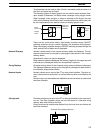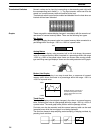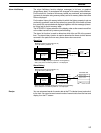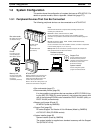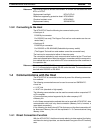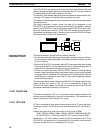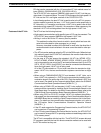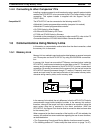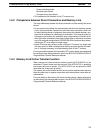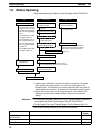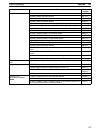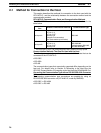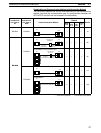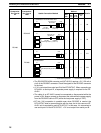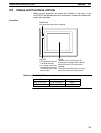
1-5SectionCommunications Using Memory Links
21
Screen switching strobe
Numerals input strobe
Character-string input strobe
• The usable area for allocation is the PT memory only.
1-5-2 Comparison between Direct Connection and Memory Link
The major differences between the direct connection and the memory link are as
follows:
• In the memory link method, the communication with the host should be carried
out by using commands. Compared to the ordinal direct connection, which can
be used requiring almost no programs, the memory link method requires a pro-
gram that is necessary for interchange of commands. This, however, gives ad-
vantages to the memory link method by using a large variety of functions avail-
able in the direct connections from major models such as a personal computer
and a FA computer equipped with RS-232C/RS-422A communication means,
allowing the PT to be suited for larger usage.
• Actual PCs have many kinds of areas, where as PT memory is a single area
with only one kind. When creating screen data by using the memory link meth-
ods, it is always necessary to allocate display parts in the PT memory.
For communication between the host and the PT by the memory link method and
for handling screen display elements, refer to the NT31/NT31C/NT631/NT631C
Programmable Terminal Reference Manual.
1-5-3 Memory Link Online Transfer Function
When memory link communications are being used, the NT31/NT31C can be
switched to Transmit mode from the host even if the NT31/NT31C is operating
and screen data can be written. (The NT31/NT31C can be returned to RUN
mode after the screen data is written.)
The memory link online transfer function can be used to replace screen data at a
fixed time each day or replace screen data with maintenance screen data for
maintenance.
For more details on the memory link online transfer function, refer to information
on the memory link online transfer function in the NT31/NT31C/NT631/NT631C
Programmable Terminal Reference Manual.



